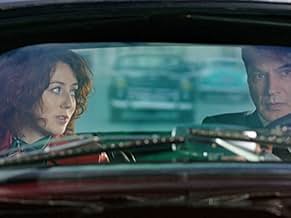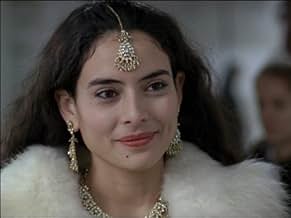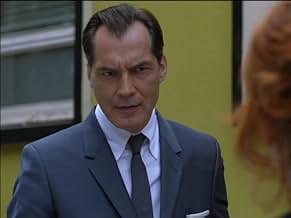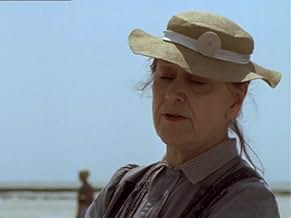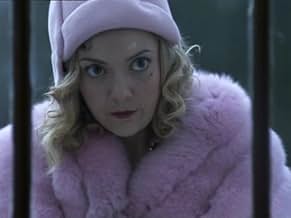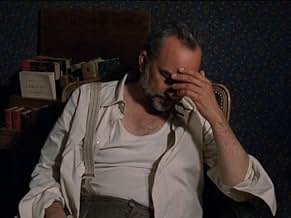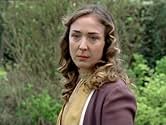Os Pequenos Crimes de Agatha Christie
Título original: Les petits meurtres d'Agatha Christie
AVALIAÇÃO DA IMDb
7,6/10
1,7 mil
SUA AVALIAÇÃO
A narrativa magistral de Agatha Christie ganha um toque de charme francês nestes mistérios envolventes e espirituosos. Estas adaptações francesas são uma nova e elegante reviravolta nos cont... Ler tudoA narrativa magistral de Agatha Christie ganha um toque de charme francês nestes mistérios envolventes e espirituosos. Estas adaptações francesas são uma nova e elegante reviravolta nos contos clássicos da Christie.A narrativa magistral de Agatha Christie ganha um toque de charme francês nestes mistérios envolventes e espirituosos. Estas adaptações francesas são uma nova e elegante reviravolta nos contos clássicos da Christie.
Explorar episódios
Avaliações em destaque
First, for the answer to expectations. Because it is a real smart serie. Preserving the spirit of Agatha Christie, giving a seductive chain of stories and beautiful performances.And proposing an interesting humor and few clever used taboos. Commisaires and women. Cases and wise manner to solve them. Especially, the French flavor gives seduction to each episode. The result - almost fascinating, surrely charming.
Agatha Christie: The Queen of Crime. Although popularised by TV movies starring Peter Ustinov, and later David Suchet, as the Belgian super-sleuth, Hercule Poirot, her page- turners have been adapted for the silver screen since 1928. This long-standing celebration of her work raises the question: is there anything left to explore?
Transpose British tales of bloody murder amongst decadent elite social circles into the quaint rural landscape of late 1930s France and we realise there is plenty of room left for investigation.
Never would the foreign location in France 2′s Les Petits Meurtres d'Agatha Christie (The Little Murders of Agatha Christie) alienate Christie fans as her work comes back to life in the coastal Calais region – one of many nods to the narrative's culturally British origins, and a tactic favoured by New Wave filmmaker Claude Chabrol. The 1930s setting also delivers nuances of anxiety to an already foreboding atmosphere.
Eccentric Commissaire Larosière (Antoine Duléry), and reluctant apprentice, Inspecteur Lampion (Marius Colucci) replace Christie's iconic sleuths in these re-imagined adaptations while providing the series' greatest quality that separates it from her original work: the womanising Larosière, a relic of the old world, soon discovers that Lampion is gay. Yet, despite homosexuality being a highly taboo subject during the period, Larosière not only accepts it but their unspoken bond blooms into an endearing father-son relationship.
In 2012, the Larosière/Lampion duo sadly came to an unexpected close. However, last year we were introduced to the new unlikely couple, this time set in the Rock'n'Roll 1950s: another womanising detective, Commissaire Laurence (Samuel Labarthe) and meddling reporter, Alice Avril (Blandine Bellavoir).
While this odd-couple's relationship has yet to mature to the same depth as their predecessors, their chemistry is unblemished. Although both highly entertaining, the true hero of this comeback series is Laurence's pin-up secretary, Marlène (Elodie Frenck), an enchanting yet somewhat dim Marilyn Monroe à la Française.
Not only does Les Petits Meurtres d'Agatha Christie successfully navigate the perilous terrain of adapting a celebrated British institution abroad, but it makes for a revitalising experience all while remaining loyal to the genre's conventions. If it somehow makes it across the Channel, it is certainly worth a watch.
Transpose British tales of bloody murder amongst decadent elite social circles into the quaint rural landscape of late 1930s France and we realise there is plenty of room left for investigation.
Never would the foreign location in France 2′s Les Petits Meurtres d'Agatha Christie (The Little Murders of Agatha Christie) alienate Christie fans as her work comes back to life in the coastal Calais region – one of many nods to the narrative's culturally British origins, and a tactic favoured by New Wave filmmaker Claude Chabrol. The 1930s setting also delivers nuances of anxiety to an already foreboding atmosphere.
Eccentric Commissaire Larosière (Antoine Duléry), and reluctant apprentice, Inspecteur Lampion (Marius Colucci) replace Christie's iconic sleuths in these re-imagined adaptations while providing the series' greatest quality that separates it from her original work: the womanising Larosière, a relic of the old world, soon discovers that Lampion is gay. Yet, despite homosexuality being a highly taboo subject during the period, Larosière not only accepts it but their unspoken bond blooms into an endearing father-son relationship.
In 2012, the Larosière/Lampion duo sadly came to an unexpected close. However, last year we were introduced to the new unlikely couple, this time set in the Rock'n'Roll 1950s: another womanising detective, Commissaire Laurence (Samuel Labarthe) and meddling reporter, Alice Avril (Blandine Bellavoir).
While this odd-couple's relationship has yet to mature to the same depth as their predecessors, their chemistry is unblemished. Although both highly entertaining, the true hero of this comeback series is Laurence's pin-up secretary, Marlène (Elodie Frenck), an enchanting yet somewhat dim Marilyn Monroe à la Française.
Not only does Les Petits Meurtres d'Agatha Christie successfully navigate the perilous terrain of adapting a celebrated British institution abroad, but it makes for a revitalising experience all while remaining loyal to the genre's conventions. If it somehow makes it across the Channel, it is certainly worth a watch.
This show sets the perfect mood for intrigue, mystery and entertainment.
Agatha Christie's works have inspired many iterations on film, although "the usual suspects" are most often repeated (Death on the Nile, etc.). So, it's not just "new" stories that are presented here, but the crimes are solved by a new set of characters who bring lots of playful dynamic to the mix.
Of the 1950's episodes - while the first two seasons very well establish the era and tone, the series really hits its stride in seasons 3 & 4. With increased confidence, everyone brings more layered nuance to the storytelling.
Overall, the production values are extremely well delivered. A special shout out to set dressers, costume and make-up. And the soundtrack engages with suspense and mischief, and perfectly balances the actors' and editors' comedic timing.
Of the performers, my personal favorite is Elodie Frenck as the divine Marlene. She's sexy, funny, the perfect blend of subtlety and charm, and occasional well-placed gaucherie, making this character irresistibly adorable.
Well cast, the other actors bring dynamic energy to their roles in unique ways.
J'adore!
Agatha Christie's works have inspired many iterations on film, although "the usual suspects" are most often repeated (Death on the Nile, etc.). So, it's not just "new" stories that are presented here, but the crimes are solved by a new set of characters who bring lots of playful dynamic to the mix.
Of the 1950's episodes - while the first two seasons very well establish the era and tone, the series really hits its stride in seasons 3 & 4. With increased confidence, everyone brings more layered nuance to the storytelling.
Overall, the production values are extremely well delivered. A special shout out to set dressers, costume and make-up. And the soundtrack engages with suspense and mischief, and perfectly balances the actors' and editors' comedic timing.
Of the performers, my personal favorite is Elodie Frenck as the divine Marlene. She's sexy, funny, the perfect blend of subtlety and charm, and occasional well-placed gaucherie, making this character irresistibly adorable.
Well cast, the other actors bring dynamic energy to their roles in unique ways.
J'adore!
Season 2. Wonderful, so funny...
The characters are very characteristic, with fun, the inspector is somewhat dog but in a funny way. The journalist a modern woman and the secretary is so suite. Congratulations.
I watched a few episodes with Superintendent Larosière and the young Inspector Lampion, set in the Thirties , and some other episodes featuring Commissaire Swan Laurence and reporter AliceAvril in the Fifties. All of them bring a fresh approach to Agata Christie's stories, a touch of comedy and a glance at the society of the time, but let me say that the earlier episodes are far more intriguing than the later ones. My rating for this series would have been a 8 or even 9 for the Larosière and Lampion duo, but a 6 for Laurence and Avril. This series definitely makes a case for having per-season ratings for TV shows on IMDb.
Você sabia?
- CuriosidadesCommissaire Laurence drives a rare Facel-Vega Facellia.
- Cenas durante ou pós-créditosDuring the closing credit sequence in the first two episodes of the series, dialogue quotes from the episode, spoken by Larosière and Lampion, are replayed over the music. Beginning with the third episode, however, there are no longer any spoken lines heard over the end credits - the only audio is the theme music.
- ConexõesFeatured in La grande histoire des Petits meurtres (2021)
Principais escolhas
Faça login para avaliar e ver a lista de recomendações personalizadas
Detalhes
- Data de lançamento
- Países de origem
- Central de atendimento oficial
- Idioma
- Também conhecido como
- Agatha Christie's Criminal Games
- Empresas de produção
- Consulte mais créditos da empresa na IMDbPro
Contribua para esta página
Sugerir uma alteração ou adicionar conteúdo ausente


